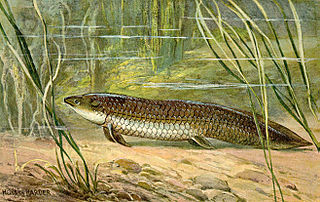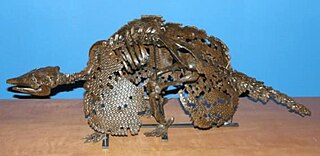
Ceratodontidae is an extinct family of lungfish with fossils known from the earliest Triassic to the Eocene.

Cycloderma is a genus of softshell turtles in the subfamily Cyclanorbinae of the family Trionychidae. The genus is endemic to Africa.
Ganorhynchus is an extinct genus of prehistoric lungfish from the Devonian period. It is only found in Mansfield, Pennsylvania.
Brevidorsum is an extinct genus of dissorophoidean euskelian temnospondyl within the family Dissorophidae.
Branchierpeton is an extinct genus of dissorophoidean euskelian temnospondyl within the family Micromelerpetontidae native to Africa.
Batrachosuchoides is an extinct genus of prehistoric amphibian from the Early Triassic of Russia. It was found in the Baskunchakskaia Series and the Lestanshorskaya Svita.
Batrachosaurus is an extinct genus of prehistoric brachyopoid amphibian that lived in Germany during the Middle Triassic (Ladinian). The genus was named by Joseph Fitzinger in 1837 and the type species, B. jaegeri, was named three years later in 1840. It may have been the same animal as Mastodonsaurus.
Gosfordia is an extinct genus of prehistoric sarcopterygian or lobe-finned fish.
Metaceratodus is an extinct genus of prehistoric lungfish in the family Ceratodontidae, with an indeterminate specimen known from the Late Triassic (Norian)-aged Lissauer Breccia of Poland and more complete specimens known from the Late Cretaceous of Queensland, Australia and Argentina. The genus was named and described by Frederick Chapman in 1914.

Megapleuron is an extinct genus of prehistoric sarcopterygian or lobe-finned fish from the early Permian of France.

Pachyarmatherium is a genus of extinct large armadillo-like cingulates found in North and South America from the Pliocene and Pleistocene epochs, related to the extant armadillos and the extinct pampatheres and glyptodonts. It was present from 4.9 Mya to 11,000 years ago, existing for approximately 4.889 million years.

Chelonoidis is a genus of turtles in the tortoise family erected by Leopold Fitzinger in 1835. They are found in South America and the Galápagos Islands, and formerly had a wide distribution in the West Indies.

The Trionychinae are a subfamily of turtles in the family Trionychidae.
Rhadalognathus was a prehistoric crocodile-like amphibian that belongs to the Mastodonsauridae family. Not much is known about this creature but it lived in the Triassic period. Rhadalognathus is also the name of the genus in which the organism belongs within. Rhadalognathus was found in northern Arizona, US, by S. P. Welles in 1947. The size of the organism is unknown but its skull is about 17in long and weighs 7lbs.

Alienochelys is an extinct genus of sea turtle known from Maastrichian-aged Cretaceous phosphates in Morocco. Its name comes from, unlike other sea turtles, Alienochelys' the jaws being adapted for a powerful crushing pattern, as well as its unusual cranial characteristics. It is a relative of the modern leatherback turtle, as well as the extinct Archelon.
Micromomyidae (Micromomids) is a family of extinct plesiadapiform mammals that include some of the earliest known primates. The family includes five genera that lived from the Paleocene epoch into the early Eocene epoch.

Hyotheriinae was a subfamily of even-toed ungulates that existed during the Miocene and Pliocene in Europe, Asia, and Africa.
Glyptoactis is a mostly extinct genus of bivalves in the family Carditidae. They have been recovered from the Castle Hayne Limestone geologic formation in North Carolina and in France.
Orthaulax is an extinct genus of sea snails in the family Strombidae.
Ilatardia is an extinct genus of bothremydid pleurodiran turtle that was discovered in the Farin Doutchi Formation of Niger. The genus consists solely of type species I. cetiotesta.







